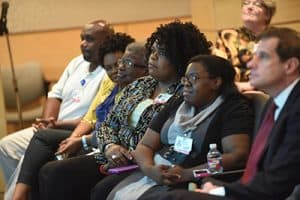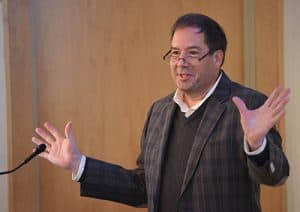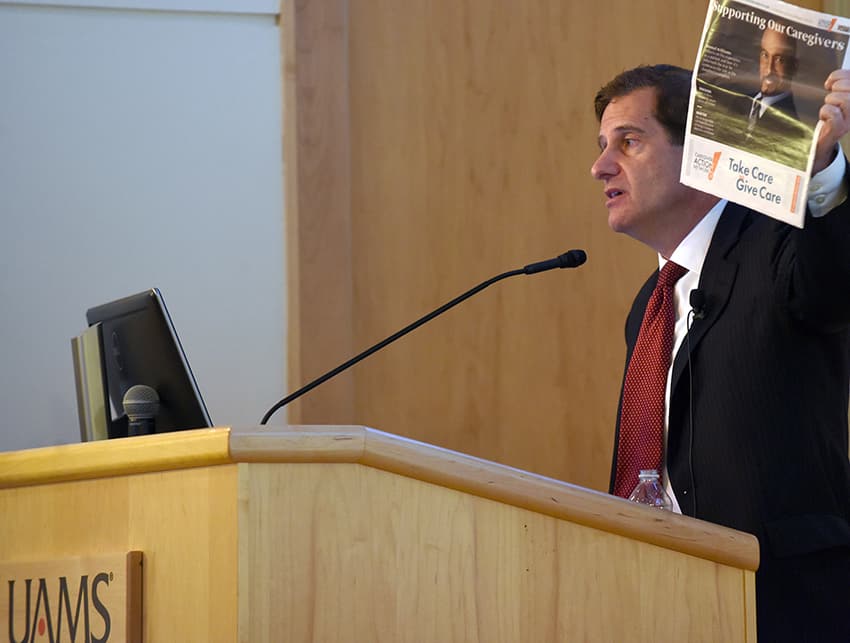Reynolds Institute Celebrates Family Caregivers
| Nov. 14, 2016 | Two guest speakers from out of state recently found something at UAMS they wanted to take back with them more than any souvenir: the Schmieding Home Caregiver Training Program.
“You have no idea how fortunate you are in Arkansas,” said John Schall, CEO of the national Caregiver Action Network. “The fact that there are several centers in the state that do training for real people, not just professionals, is amazing. If there is one thing I could do over the next few years, it would be take the Schmieding program and create 800 of them across the United States.”

Members of the Spencer family, several of whom were caregivers for loved ones, attended the caregiving celebration at the Reynolds Institute. Guest speaker John Schall, far right, sat next to them after his presentation. A video about the family’s experiences also was screened at the event. Click here to see the video.
Schall and Joel G. Hopper, developer of the Caregiver Ally Program at Kimberly-Clark Corp., both delivered hour-long presentations at the UAMS Donald W. Reynolds Institute on Aging as part of a celebration of National Family Caregiver Month.
At seven training sites around Arkansas, the Schmieding Home Caregiver Training Program provides education and skills training to family members and paid caregivers caring for older adults in the home, allowing older adults to have choices about how they are cared for.
In his presentation, “How the Caregiver Experience Can Positively Impact the Patient Experience,” Schall sketched a portrait of the people and types of family caregivers there are, the challenges they face and how the network he heads tries to help them.
The need for caregivers is expanding as the number of people older than 65 grows. More and more men are filling the role of caregiver, almost equal to the number of women. Caregivers increasingly include younger generations, even many Millennials, Schall said.
As the 90 million caregivers in the United States annually provide the equivalent of $522 billion worth of care, they often find themselves performing medical procedures in the course of taking care of a loved one. These can even include wound care and home infusion therapy.

Joel G. Hopper also delivered a presentation about family caregiving at the institute’s celebration.
“I’m not saying that’s good or bad, but it is the reality,” Schall said.
Family caregivers financially contribute an average of $10,000 annually to the care of a loved one. They also experience the non-monetary costs of stress-induced depression and are more than twice as likely to have chronic health conditions like high-blood pressure and diabetes when compared to the general population.
The Caregiver Action Network works to help them cope with such challenges by providing education, peer support and resources to family caregivers across the United States.
Hopper credited the network with giving valuable assistance to the Caregiver Ally Program at Kimberly-Clark.
Although Hopper has 25 years of experience with Kimberly-Clark, maker of such products as Kleenex and Huggies, he also is a caregiver to his parents. Under his leadership, the Family Caregivers Network has earned recognition for delivering employee caregiver solutions and been featured in national publications such as USA Today and Forbes. The network provides Kimberly-Clark employees information, support and advocacy for family caregiving issues.
“We are trying to bring those conversations about caregiving forward into the work place,” Hopper said. “Many times we find ourselves in water-cooler conversations about our children but rarely about our parents and how we are helping them.”
Although Kimberly-Clark is a strong supporter of the network, FCN is not an extension or program of the corporation’s employee assistance program or its human resources department. Its leadership is voluntary and overseen by an executive committee of caregiving employees, Hopper explained.
Like Schall, he was impressed by what he saw in Arkansas.
“I want to be able to find a way to take the tools you are providing to caregivers here and somehow bring them to Wisconsin,” Hopper said. “Maybe we can just drop one of your centers right down there. We do a lot, but none of it compares to the hands-on training done here.”
Other speakers at the celebration included Jeanne Wei, M.D., Ph.D., executive director of the Donald W. Reynolds Institute on Aging; Claudia Beverly, Ph.D., R.N., director of the Arkansas Aging Initiative at the Reynolds Institute and Robin McAtee, Ph.D., R.N., associate director of the Arkansas Aging Initiative.
